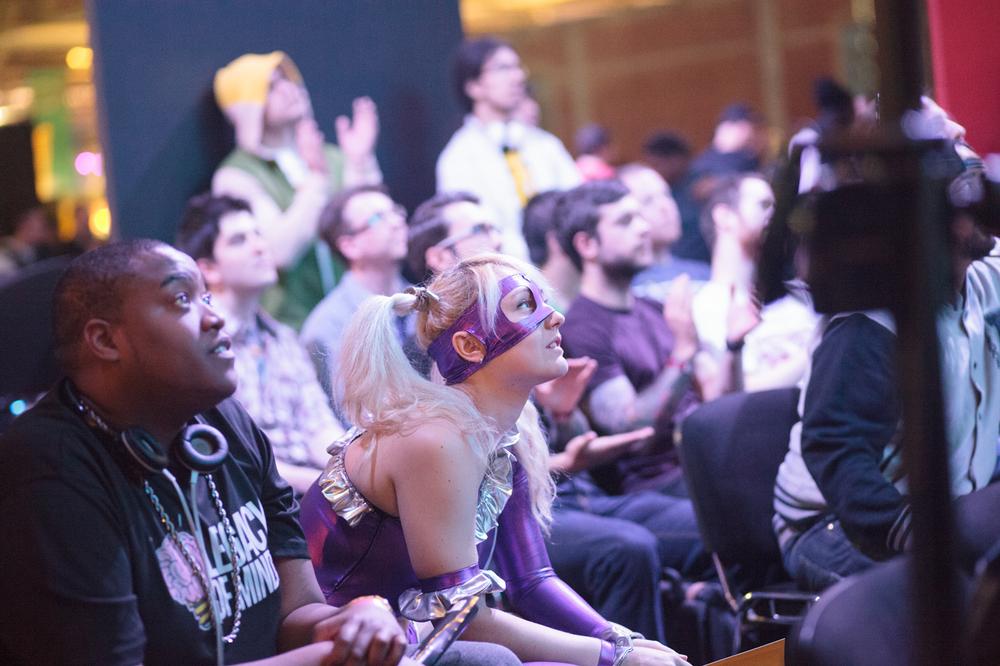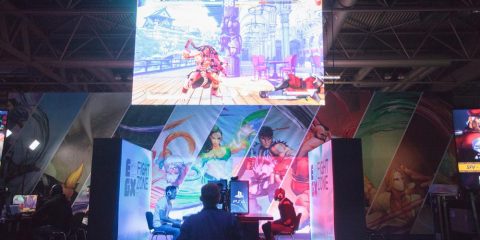Welcome to our swanky new website! It’s been an intense week of web development, and I’m not sure I’ve ever felt quite this proud of a website I’ve worked on. I hope you like what you see, and do let me know if you have any issues. I’ll be announcing some of our new features over the coming weeks. For now, on with the roundup!
Textures
There are two photo essays in this week’s roundup! I’m thrilled to include them, and I would love to see more. Please keep recommending them!
- Street Fighter Has Become the World’s Smallest Premier eSport, and That’s OK | VICE
Gary Dooton shares a photo essay (and also regular text essay) from EGX. The sense of spectacle combined with cosiness described in the text essay comes through strongly in the carefully-frames photographs.
- Dear Esther: Landmark Edition is a delicate, embalmed object | Kill Screen
Gareth Damian Martin considers how an object calcifies as it becomes a part of our memory, in this part-photo essay.
Audiogames
Moving on from sight to sound, these two articles examine the role of sound as a core part of how games communicate with players.
- The neglected history of videogames for the blind | Kill Screen
This remarkable feature looks into the material context of developing audiogames over the past 20 years, as well as describing the direct experience of playing them when sighted. - Thoughts and opinions on sonically handling fail states in video games | Designing Sound
Wilfried Nass interviews sound designers on the nature of failure, in games, art, and life.
“‘I think the closer you try to approach reality, the more fragile it becomes’, stated Martin. ‘If you want to suggest something being real, the illusion will fall apart as soon as the player will encounter even the tiniest mistake. (…) If you’re sitting on your couch and playing a game on the TV, you don’t see yourself as being there, there is some kind of abstraction layer between you and the experience, some kind of ‘contract’ that the world presented to you is on a screen.'”
Outside the box
I often feature pieces that bring in texts from beyond games and blogging — either a primary source, or ideas from another field — to make sense of our experiences in games. Here are the beginnings of some resources on how to find that material.
- Game Industry Reading List – Zack Hiwiller
Zack is asking for recommendations on the kind of books that have been helpful to people who think about games, categorized by the field they were originally written for. - The secret world of video game secrets | Games | Geek.com
Jordan Minor talks to the people who uncover game trivia about the process behind their work, with some valuable lessons for any of us who write about games.
“Old trailers, screenshots, and gameplay footage from conventions are good resources to start with, but Gill says researchers also need to think outside the box. ‘A few techniques I personally use are timeframe specific searches for interviews, getting in touch with game developers on LinkedIn, and using targeted keywords with quotation marks.'”
“We believe in freedom, but…”
These two features examine institutions that were concerned with establishing cultural power, in actual-history UK and alternate-history USA.
- Pirates of the airwaves: How Sega won the hearts and minds of a generation | Eurogamer.net
This excellent feature uncovers the specificity of Sega’s marketing in the UK in the 1990s, with a local firm pushing for a particular kind of brash irreverence that had significant cultural impact at the time. - The cycles of violence in BioShock: The Collection | Kill Screen
Brent Ables argues that the BioShock series reflects a shift toward a critically self-reflexive notion of the left.
“Infinite’s core invocation of historical materialism adds a new dimension to the determinism that all of the games explored at some level, and poses a fresh challenge for anyone who considers themselves a political descendent of Marx. Contemporary leftists have a tendency towards the the absolutization of ahistorical values—equality, inclusion, identity—but we have yet to reconcile this tendency with the historical and cultural perspectivism that seems appropriate to a post-global society. We believe in freedom, but only to the extent that it lets us affirm what we already are.”
Capitalist Fantasy
Austerity and the growing class of precarious workers are the backdrop for these two articles on games, play and labor.
- Is it a problem when games are a second job for the unemployed? | GamesIndustry.biz
Brendan Sinclair considers the relationship between game design and economic precarity. - ‘Diaries of a Spaceport Janitor’ Asks Gamers to Find the Beauty in Garbage | VICE
Joseph Knoop expands these reflections on the reward loops of late capitalism in his feature on Diaries of a Spaceport Janitor.
“‘Video games and capitalism go together like peanut butter and jelly,’ says Shasha. ‘In most games, you do X thing and you get immediate feedback and progress. That’s this sort of mythologized capitalist fantasy. Our game uses the same system, it’s just that you’re not expecting to get anywhere.'”
Unbounded Love
Game systems that represent emotional connections between people are the focus of these pieces, one on friendship, the other on parenthood.
- Mechanizing Friendship in ‘Slayer Shock’ | Gamechurch
M. Joshua Cauller reflects on the shallowness of a game mechanic, wondering whether real life is automatically any deeper. - What Does It Mean to Be a Mother: Mothering and Maternal Thinking in Ori and the Blind Forest Not Your Mama’s Gamer
Bianca Batti and Jynx Boyne consider femininity and queer families of choice in a game that strongly references themes of parenting and kinship.
” Perhaps the game’s fluidity in its representations of the ways maternal thinking can be embodied blurs the boundaries between parenting roles and destabilizes the normative, binaristic ways we often conceive of motherhood and fatherhood. And perhaps this blurring, this fluidity, allows Ori and the Blind Forest to reimagine, reframe, and redefine family structures as well–because this fluidity results in the fact that family, in the game, is not simply based on biological ties but on unbounded love “
Femslash
The final two sections of this roundup deal with co-creation and fan works. First, two articles on fan works that create romantic pairings between female characters.
- Can love fix Life is Strange? | ZAM – The Largest Collection of Online Gaming Information
Jody MacGregor reflects on the history of fan fiction and the creative goals of a dating sim tribute. - Why Overwatch Fans Are Obsessed With ‘Shipping’ Its Female Characters | Kotaku
Nico Deyo talks to femslash content creators about what fandom adds to media that might not be queer-inclusive out of the box.
“It’s worth noting that this celebration is largely produced by the fandom, much like most of the femslash that’s come before it. Queer female representation is hard to come by and often, these characters are swiftly killed after expressing their sexuality. Blizzard isn’t responsible for the F/F revolution of Overwatch, the fandom is.”
Cyberspace terrarium
To round off the pieces on co-creation, these two pieces address games that were made wholly or in part by their players, examining the unexpected sort of stability that can arise from somewhat anarchic communal creation methods.
- Better Than Black and White: One Man’s Decade-Long Quest to Remake ‘Metroid II’ | VICE | United Kingdom
David L. Craddock learns from the creator of AM2R that a commitment to community participation can be the one thing saving a project from extinction. - Twenty Years Later, A Furry MMO Fights To Stay Alive | Kotaku
Cecilia D’Anastasio paints a deeply endearing portrait of an MMO that is keeping the democratic ideals of turn-of-the-millennium online gaming alive.
“Furcadia is its own cyberspace terrarium, a vestige of early virtual worlds and all their virtues. It’s a vintage dream, crystallized by its community, from when players and developers were of the same caste and user-generated content was the very fabric of online gaming. That DIY ethos has preserved Furcadia for two decades; but has also stagnated it—an accusation waged by frustrated Furcadians exposed to modern MMORPGs.”
How This Week in Videogame Blogging Works
Thanks for reading another roundup of This Week in Videogame Blogging! The process that we go through to bring these links can be a little opaque at times, so last week I put together a guide on how our curation process works. You can check that out here.
Subscribe
Critical Distance is community-supported. Our readers support us from as little as one dollar a month. Would you consider joining them?
Contribute
Have you read, seen, heard or otherwise experienced something new that made you think about games differently? Send it in!








